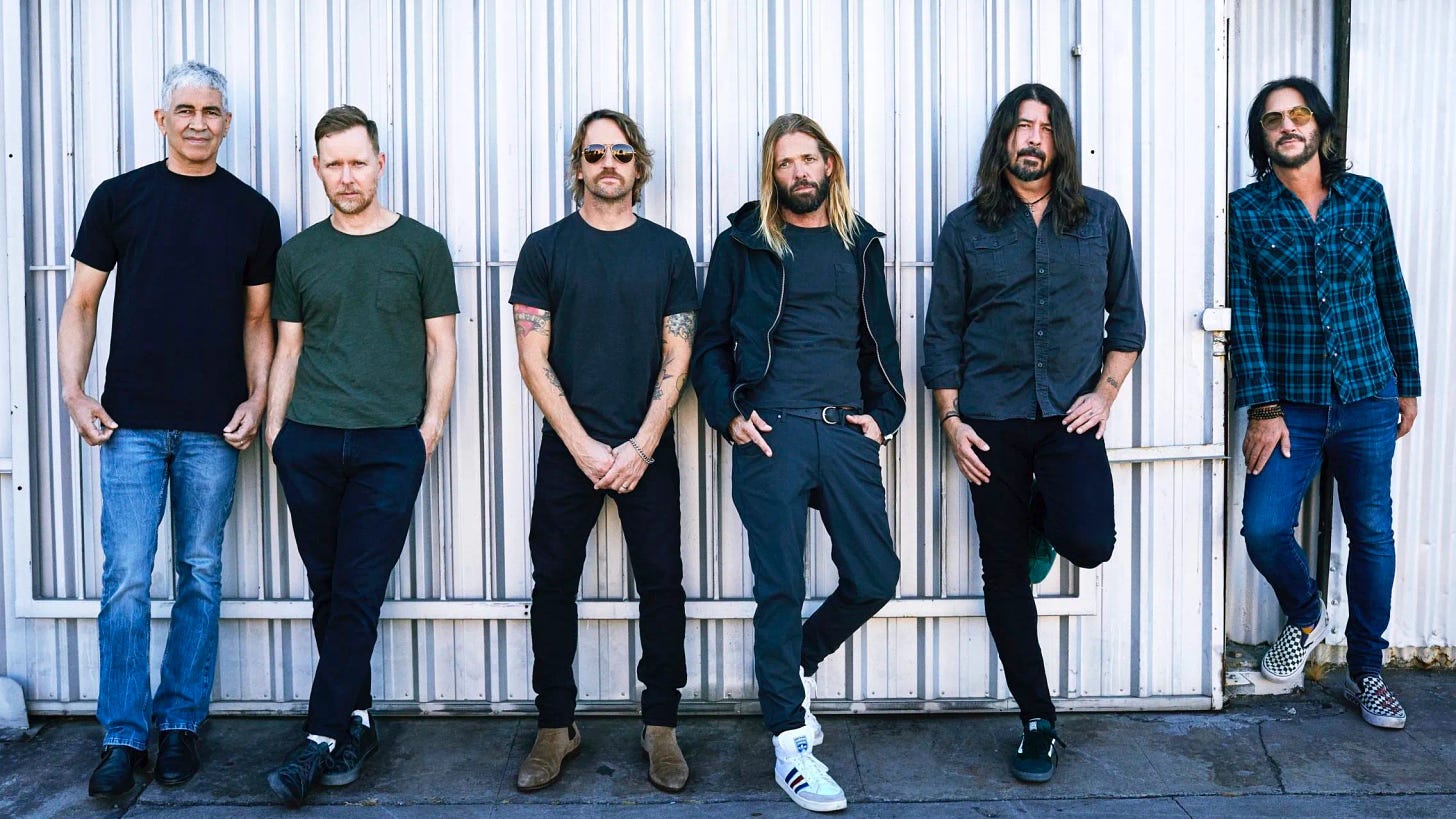If there’s ever been a time for an aggressive, confrontational, full frontal rock assault to help make sense of the past 12 months, it’s now. Sadly, the Foo Fighters haven’t delivered on Medicine at Midnight. Why? I have a few thoughts. Let’s go…
It wasn’t the hand claps, gospel singers and “woo hoos” of Making A Fire that raised the first eyebrow. The absolutely soppy, mopey and ropy ballad Chasing Birds didn’t seem out of place either. Even the David Bowie-indebted title track, a pedestrian B-side at best, didn’t raise any red flags.
Then I heard the cowbell. Yes, a cowbell, one that’s chimed over and over again on Cloudspotter, its incessant clang ruining what could have been an absolute belter of a Foo Fighters song.
It’s at that point that I sat up and thought: What the fuck is going on here?
Medicine at Midnight is the tenth studio album by the Foo Fighters, and it does not tick any of the boxes of a regular Foo Fighters album. There are no call to arms, frantic metal riffage or guttural yells. Also absent are gigantic stadium anthems destined to be sung by masses congregating in stadiums.
Instead, there are strange detours, weird divergences, and wonky experiments. Take the stuttering Shame Shame, which takes the Foos’ blueprint for rocking and buries it in strings and whispered vocals. It’s like the Foos got sick of being the Foos and decided to start a different band, one without 10 albums and 25 years of baggage to deal with.
Medicine at Midnight is a “fucking weird” album. That’s not me saying that. That’s Dave Grohl, the band’s relentlessly peppy front man who admitted as much in this recent interview with NME. It definitely lives up to that description. In fact, fucking weird might be the best way to describe it.
All of this is a surprise. Grohl’s Foo Fighters trade in a certain type of comforting rock n roll predictability. Every few years, a new album appears, one that, aside from a few slight stylistic detours, sounds much like the others. Can anyone name three tracks from Echoes, Silence, Patience & Grace, their 2007 album? How about 2017’s Concrete and Gold? Exactly.
But the point of a new Foos record isn’t to make dramatic stylistic shifts. They don’t need to switch things up. A new album is just a chance for Grohl and co to remind you they have their formula, they’re still there, and they’re ready to sell out a stadium near you sometime soon. Rinse and repeat.
But this is 2021, and these are not times to mosh along to Times Like These. World tours are cancelled, stadium shows are shuttered. Guitar bands are struggling to find a way forward in a world that does not want them to rock. Case in point: the new Weezer album, which swaps guitar crunch for maudlin strings and schleppy ballads. It doesn’t suit them. It doesn’t work. It shows…
Back in February of last year, Green Day released a new album called Father of All Motherfuckers, which I completely forgot about, and still haven’t heard. But I probably would have, if their epic three-way Hella Mega Tour with Weezer and Fall Out Boy, destined to visit Auckland in November, wasn’t cancelled because of Covid-19.
Even the godfathers are struggling. Without a beer-soaked world tour to back it up, AC/DC’s tried-and-true throwback album Power Up, released with little fanfare at the end of last year, failed to find the right socket to plug into.
Medicine at Midnight finds itself in similarly unstable territory. There’s no denying the Foos are trying something different. It’s a strange listen. There are strings and choirs and funky bits and Bowie nods and all kinds of other head scratching bits and pieces to try and wrap your ears around.
Even when they stumble upon a typical Foos groove, as they do on Waiting on a War, the group only touches on that energy of old, then dials it back. It’s a song that should be sung from all four corners of a rammed stadium, but here it sounds strangely muted, undercooked and is cut short before it really gets going.
I’m not the only one finding Medicine at Midnight a strange listening experience. While legacy publications like Rolling Stone and NME have heaped praise on the album, probably because they have to, plenty of others have put the boot into it, with the Financial Times calling it an “ill-suited stylistic shift” and Mojo labeling it “strangely impersonal”.
Perhaps the most telling review comes from The Guardian critic Alexis Petridis, who slammed it as “music for toilet breaks at their gigs”. Youch.
But that headline makes my point perfectly. The Foos recorded Medicine at Midnight before the pandemic, just as they were preparing to head out on their 25th anniversary world tour. A fan-souring wonky dud of an album doesn’t matter if fans can still turn up to their three-hour shows and scream along to Everlong and My Hero.
Maybe it’s just too much to expect corporate rock dads to make music that meets this moment. Or maybe they’ve already made it. “Real life is so hard / We hide in the stars,” croons Grohl on My Poor Brain, a headache-inducing stunner from 1997, that includes the line, “I’m falling apart.”
It might be about lost love, but to these ears it sounds far more relevant in 2021 than anything on Medicine at Midnight. Reviewing the damned thing makes me want to blast The Colour and the Shape all over again. In fact, I might go do that right now…
If you’re a fan of Boiler Room, and can afford it, please consider becoming a paid subscriber. I’m hoping to do much more with my newsletter this year, including interviews and investigations and all sorts of other good stuff. But all that journalism takes time. If you’re interested in helping out, you can find out how here…




